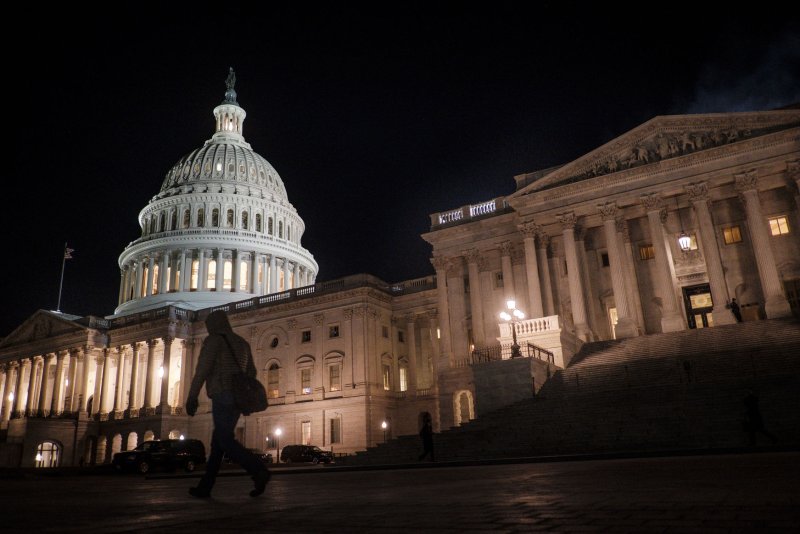1 of 3 | The House passed a stopgap spending bill Tuesday that the Senate will likely either reject or amend, meaning the House will have to address the legislation again. Photo by Pete Marovich/UPI |
License Photo
Feb. 6 (UPI) -- The U.S. House of Representatives passed a stopgap bill to increase Defense funding and prevent a government shutdown for six more weeks.
The bill, which passed in the House by a vote of 245-182, would fund domestic government programs through March 23 while giving the Pentagon a full-year budget of $659 billion, up $52 billion from 2017.
House Republicans said the bill provides certainty to U.S. military planners who were frustrated during last month's three-day partial government shutdown.
"Our men and women in uniform aren't bargaining chips, and there's no reason for Senate Democrats to keep holding our military hostage for their political ploy," said AshLee Strong, a spokeswoman for House Speaker Paul Ryan, R-Wis.
House Democratic Leader Nancy Pelosi, D-Calif., said the bill was an attempt to slash funding for education, infrastructure and other domestic programs.
"Instead of working constructively with Democrats to meet the needs of the American people, Republicans are trying to starve the domestic budget," she said.
The bill will be sent to the Senate where Democrats are likely to reject or amend it and send it back to the House for another round of voting.
"Everyone understands that this will probably end up being a ping-pong situation" of legislation flip-flopping between the House and Senate, Rep. Carlos Curbelo, R-Fla., said Monday night. "And we'll see where the ball lands."
Senate Democratic leader Charles Schumer of New York said Democrats oppose the bill because they want to address all funding questions at the same time.
"As I've said many times before, a cromnibus will not pass the Senate," Schumer said Tuesday. "We want to fund defense, absolutely. We want to fund programs to help the middle class too, like education, like infrastructure, like scientific research. We're standing up and saying we must do both."
Earlier Tuesday, Schumer said Republican and Democratic leaders in the Senate were nearing agreement on a two-year budget bill to avoid another government shutdown.
Schumer met with Senate Republican leader Mitch McConnell of Kentucky in the Republican's office and told reporters before his floor announcement he had a "good meeting."
"There are still some outstanding issues to be resolved, but we are closer to an agreement than we have ever been," Schumer said on the Senate floor.
The budget bill would set levels for fiscal 2018 and 2019.
Unlike the House -- which needs a simple majority to approve legislation -- the Senate requires 60 votes, meaning help is needed from Democrats because the Republicans have a 51-49 edge in the upper chamber. Last month, the government closed and non-essential services ceased for three days when members of the two parties couldn't agree to a deal.
With the bill failing to pass, McConnell could amend the House resolution with any deal he and Schumer work out. If Senate leaders can't reach a deal by the deadline, McConnell could amend the House resolution with a fallback option to keep federal agencies open temporarily.
The current stopgap spending resolution expires at 12:01 a.m. Friday.
"There's no appetite for continuing that type of approach. I sincerely hope I never face that again," said Senate Democratic Whip Dick Durbin of Illinois said of another shutdown looming.
Last month, Senate Democrats agreed to keep the government running for two and-a-half weeks after ending their holdout to address the status of 800,000 undocumented immigrants who arrived in the United States as children. They supported a short-term spending bill that didn't address immigration because McConnell promised he would allow debate on immigration legislation.
Also, Congress needs to raise the borrowing limit in March. The Congressional Budget Office said last week the limit will be reached earlier than projected because of less revenue from the $1.5 trillion tax cut. The current level is $20.5 trillion.
"I'm pleased to report that our bipartisan talks are continuing to progress toward an agreement on spending caps and important priorities all of us are eager to address," McConnell said on the Senate floor Tuesday.















